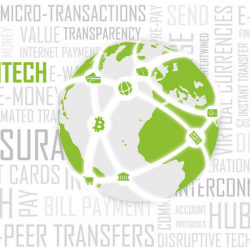How FinTech Serves the Underserved

Finance has long existed under a hierarchical system in which the elite are given far superior services and rates and the lower classes are given sub-par (or no) services. With FinTech the financial game is changing and there is a reason why FinTech is being called the democratization of the financial system.
After all, the glory of modern technology is that we are no longer confined to brick-and-mortar 9-to-5 businesses and we should be using this to the best of our advantage to help better meet people’s needs. And perhaps more importantly, the technology should be used to reach the underserved. FinTech understands this and is using technology to bring banking to a wider audience.
By opening up access to financial services, FinTech is reaching those clients ignored by big banking. Take shift workers for example. In these situations, the introduction of FinTech technology has brought in greater access to financial services and advisors and this allows the system to do a much better job when it comes to meeting the needs of its varied customers and their schedules. Then, by digitizing financial services and introducing the mobile wallet, the billions of people who lack easy access to bank buildings and accounts are finally given a way to better manage their finances.
Or look at what is happening when it comes to credit. Thanks to FinTech, people around the world—whether they are aspiring entrepreneurs or just in need of cash for everyday life—can finally access loans without being saddled with crushing interest rates from predatory lenders. Companies like Aski Capitaland OnDeck are paving the way for entrepreneurs who need to fund their ideas. This opens up so many doors for the underprivileged, giving them the opportunity to improve their lives without being crushed under the weight of payday loans.
Although not directly related to credit, the crowdfunding breakthrough is a similar use of technology that will open doors for the underserved. Through platforms like CircleUp, Entrepreneurs can take their products directly to the public and get them to fund the development process, giving them a way to bypass the burden of the business loan process. For entrepreneurs who are unable to access conventional business loans, crowdfunding can prove to be a vital business tool. In this way, FinTech is funding innovation.
FinTech is also opening up the field of investing by offering robo-advisors. As this technology expands, it will bring investment to the greater population. With low management fees and less of an initial portfolio requirement, the new technology is bringing investment banking into the future and to the sections of the population who were not seen as viable investors by the old system. As well, these advisors can target a specific area of the market (like OpenInvest, which targets impact investing), giving people a sense of control and purpose when it comes to their portfolio and advisors.
Knowledge about income inequality is growing just as the level of it reaches record highs. This knowledge along with FinTech and the benefits FinTech brings with it will help us fight back against rising income inequality…you can bank on it.
How Women Are Leading the Blockchain & RegTech Revolution
It has been well established by this point that FinTech is bringing in a banking revolution. Finally, after years of a financial system tilted to benefit the upper crust, finance is becoming a system that really will benefit all people.
This can be seen in so many ways, from remaking the tipping process to improving the mortgage industry to introducing biometrics. But potentially the greatest impact can be seen when you start to look at the gender gap. Although it is still in many ways a man’s game (12% of CEOs in the financial industry are women and women hold less than 20% of the roles in the boardroom) women are having a very strong impact on FinTech’s growth and are helping to steer it in the right direction. In fact, compared to many other financial sectors, FinTech is (becoming) much more diverse and equal.
Look at Blockchain and RegTech: Two terms that weren’t on anyone’s radar in the past and are now revolutionizing the technology industry. Together these technologies are an unstoppable powerhouse, bringing forth new possibilities to those who know how to use them…and women around the world are blazing the trail when it comes to their development.
Consider Digital Asset, the leading force in distributed ledger technology and a trailblazer in the field of blockchain. Led by Blythe Masters, the company provides a digital access platform (or distributed ledger platform) to help financial institutions with their infrastructure issues. The company has a solid client and investment base, as even the big players can see how important this technology is to the growth of the industry.
Then there is Everledger, a digital ledger set to take the world by storm. The brainchild of Leanne Kemp, Everledger has devised a way to track the digital footprint of valuables (like diamonds). This new use of FinTech technology will prove invaluable for companies needing a high level of security when transporting and tracking their products.
This of course is just scratching the surface of the revolution. For more, check out Veriluma (Elizabeth Whitelock), Suade (Diana Paredes) and Trulioo (Tanis Jorge), other fantastic examples of innovative FinTech companies being led by women.
These women are important when it comes to today’s industry, but we also can’t forget about how important they are to women currently working towards their STEM degrees and waiting for their chance to break into the industry. Learning how these women created their own businesses and made a real impact in the FinTech world will be a great learning tool for tomorrow’s trailblazers. These titans of tomorrow can follow them to the boardroom by using the latest breakthroughs in financial technology to bring new advantages to the masses.
The next stage of FinTech is set to continue to remake our financial world and I can’t wait to see what’s in store for us.
How FinTech Will Help You Budget

The financial crisis of 2008 hit a lot of people, but the damage inflicted on millennials was dealt out on several levels. Not only were savings attacked, but they had to enter into a depressed job market while saddled with university/college debt. The repercussions of this are still being felt, as this generation is less likely to own real estate or automobiles than generation X or baby boomers.
That’s not for lack of want: 80% of millennials want to own property and cars, but can’t afford to buy in the current market.
The question then becomes: what do you do if you are a millennial wanting to get a solid grasp of your savings plan? (Or for that matter, what do you do if you aren’t a millennial but still need to get your financial ducks in a row?) It shouldn’t be a shocking fact that FinTech is ready to help. Innovative startups are waiting in the wings, raring to help people balance their pocketbooks and master how to budget.
Take Exeq, a great option for those who feel they need a little help managing the budgeting process. This app tracks where you spend your money and lets you see this info in a way that makes it easy to see where you are overspending and how you can cut back. As well, users can interact with friends within the app and (soon) will be able to get better recommendations and better deals based on your spending habits. Currently in beta testing, the app is set to officially launch in New York City (the hotspot of overspending) at the end of summer and then will expand to other major cities. This is great news for anyone still struggling to understand where their money goes (and could benefit from a budget).
Another great option is Goodbudget. This app is a modern update on the envelope budgeting system, giving people an easy and clear way to divide their income into saving and spending categories and then ensure they don’t overspend in certain areas. Plus, as budgeting is often a team effort, the Goodbudget software lets users easily share their budgets with the proper parties, making sure everyone involved is on the same page.
Spending money without a budget is a surefire way to find yourself suddenly strapped for cash and unable to pay vital bills. That being said, the old-school method of budgeting (via paper or spreadsheets) can seem time-consuming and cumbersome and easily turns off busy millennials devoted to technology. By making it easy and accessible, FinTech will bring budgeting to the masses and help stave off another financial disaster. Give it just a bit of time and we might just find ourselves in the most financially aware society the world has ever known. Imagine the potential that will bring.
Can FinTech Solve Climate Change and Income Inequality?

Climate change, FinTech and income inequality. At first glance, they seem like unrelated (although life-altering) concepts. In reality, though, they are deeply interlinked.
Climate change stands to be one of the most important issues of our time, a problem that needs to be solved (or at least properly addressed) before too much damage has been done and human life (as we know it) will be unable to continue.
Income inequality is a sad byproduct of human society and shows the damaging effects of hierarchy and greed. We have more than enough for the world’s population, yet stack the deck so only chosen sections get to fully benefit from the accumulated wealth.
These two terrors interlock and grow in proportion to each other. The more income inequality rises and power gets concentrated, the more our planet gets exploited (double the output at one-third the cost) and the closer we get to reaching midnight on the Doomsday clock.
Humanity is starting to recognize the injustice of these concepts and the faulty structure that led to these problems. The good news? There is a solution and that solution is FinTech. Big Data, for example, is being used to explore the best way to both save our planet and save our society. Water companies are leading the way in this respect. Last week we talked about the great work PlutoAI is doing to improve the water asset management systems. Aqueduct (a product from the World Resources Institute) is another great initiative seeking to improve the world through water management. This FinTech system helps governments and businesses access and analyze the water data to pinpoint where there are risks or dangers and where there is real opportunity. Billions of lives will be saved by this upgrade of water technology.
Looking to Africa, we can find real innovators in the field of FinTech environmentalism. One example is M-KOPA, a company that provides homes with solar power. M-KOPA uses FinTech as a form of payment and uses a pay-as-you-go model, allowing poorer clients access to the technology and thus increasing its reach.
And there is even a global effort underway: the Green Digital Finance Alliance. Recognizing the potential that FinTech holds to improve both our financial world and our environment, the Alliance seeks to explore how FinTech can be better used to create a better and cleaner Earth.
FinTech is aiming to do much more than just make the act of getting access to money easier. Through the reinvention of the financial system, FinTech is also helping to better our everyday lives and our planet. Yes, FinTech is going to improve our water and energy systems and, in turn, lead us to a brighter future.






